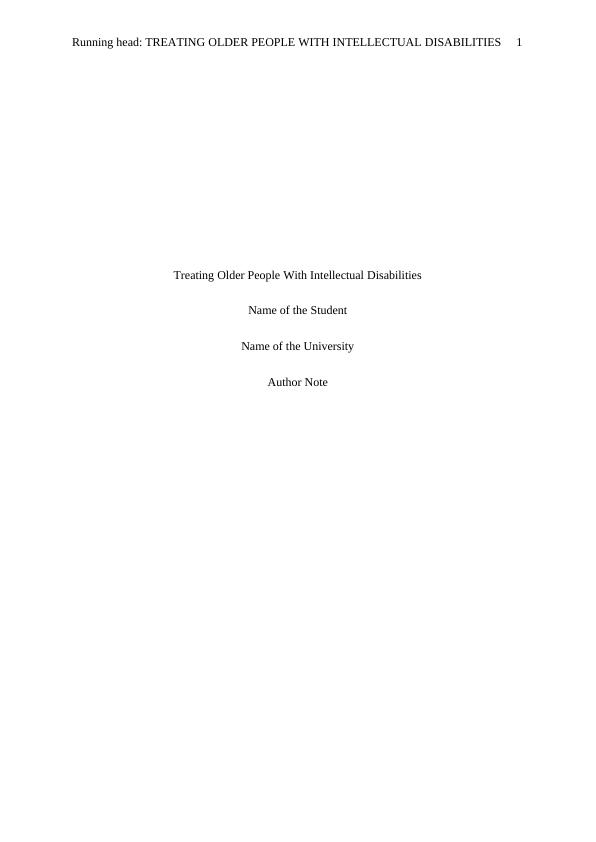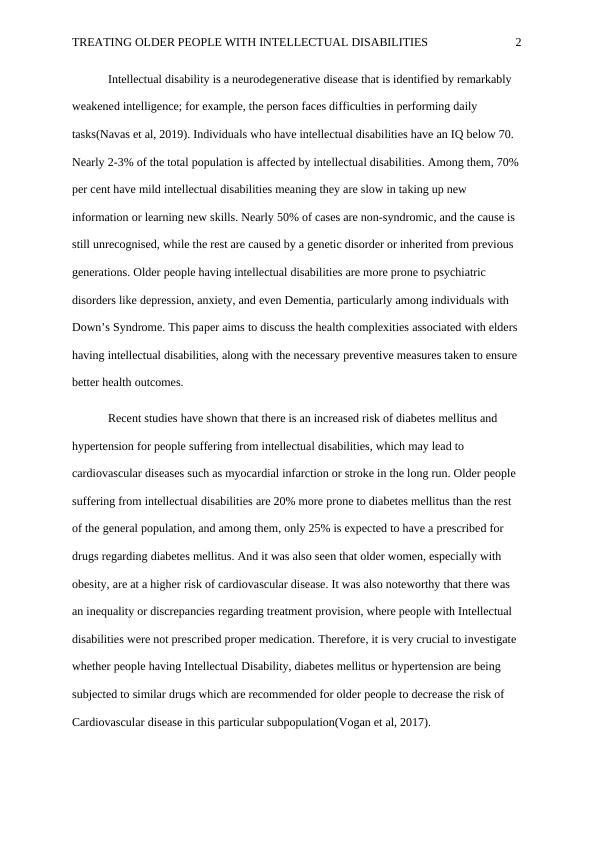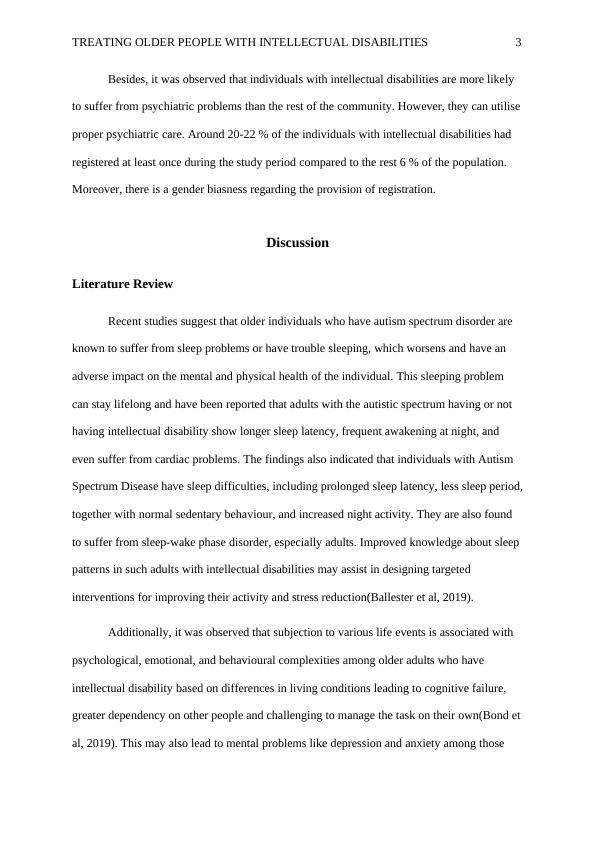Treating Older People With Intellectual Disabilities | Doc
Added on 2022-08-13
10 Pages2870 Words18 Views
Running head: TREATING OLDER PEOPLE WITH INTELLECTUAL DISABILITIES 1
Treating Older People With Intellectual Disabilities
Name of the Student
Name of the University
Author Note
Treating Older People With Intellectual Disabilities
Name of the Student
Name of the University
Author Note

TREATING OLDER PEOPLE WITH INTELLECTUAL DISABILITIES 2
Intellectual disability is a neurodegenerative disease that is identified by remarkably
weakened intelligence; for example, the person faces difficulties in performing daily
tasks(Navas et al, 2019). Individuals who have intellectual disabilities have an IQ below 70.
Nearly 2-3% of the total population is affected by intellectual disabilities. Among them, 70%
per cent have mild intellectual disabilities meaning they are slow in taking up new
information or learning new skills. Nearly 50% of cases are non-syndromic, and the cause is
still unrecognised, while the rest are caused by a genetic disorder or inherited from previous
generations. Older people having intellectual disabilities are more prone to psychiatric
disorders like depression, anxiety, and even Dementia, particularly among individuals with
Down’s Syndrome. This paper aims to discuss the health complexities associated with elders
having intellectual disabilities, along with the necessary preventive measures taken to ensure
better health outcomes.
Recent studies have shown that there is an increased risk of diabetes mellitus and
hypertension for people suffering from intellectual disabilities, which may lead to
cardiovascular diseases such as myocardial infarction or stroke in the long run. Older people
suffering from intellectual disabilities are 20% more prone to diabetes mellitus than the rest
of the general population, and among them, only 25% is expected to have a prescribed for
drugs regarding diabetes mellitus. And it was also seen that older women, especially with
obesity, are at a higher risk of cardiovascular disease. It was also noteworthy that there was
an inequality or discrepancies regarding treatment provision, where people with Intellectual
disabilities were not prescribed proper medication. Therefore, it is very crucial to investigate
whether people having Intellectual Disability, diabetes mellitus or hypertension are being
subjected to similar drugs which are recommended for older people to decrease the risk of
Cardiovascular disease in this particular subpopulation(Vogan et al, 2017).
Intellectual disability is a neurodegenerative disease that is identified by remarkably
weakened intelligence; for example, the person faces difficulties in performing daily
tasks(Navas et al, 2019). Individuals who have intellectual disabilities have an IQ below 70.
Nearly 2-3% of the total population is affected by intellectual disabilities. Among them, 70%
per cent have mild intellectual disabilities meaning they are slow in taking up new
information or learning new skills. Nearly 50% of cases are non-syndromic, and the cause is
still unrecognised, while the rest are caused by a genetic disorder or inherited from previous
generations. Older people having intellectual disabilities are more prone to psychiatric
disorders like depression, anxiety, and even Dementia, particularly among individuals with
Down’s Syndrome. This paper aims to discuss the health complexities associated with elders
having intellectual disabilities, along with the necessary preventive measures taken to ensure
better health outcomes.
Recent studies have shown that there is an increased risk of diabetes mellitus and
hypertension for people suffering from intellectual disabilities, which may lead to
cardiovascular diseases such as myocardial infarction or stroke in the long run. Older people
suffering from intellectual disabilities are 20% more prone to diabetes mellitus than the rest
of the general population, and among them, only 25% is expected to have a prescribed for
drugs regarding diabetes mellitus. And it was also seen that older women, especially with
obesity, are at a higher risk of cardiovascular disease. It was also noteworthy that there was
an inequality or discrepancies regarding treatment provision, where people with Intellectual
disabilities were not prescribed proper medication. Therefore, it is very crucial to investigate
whether people having Intellectual Disability, diabetes mellitus or hypertension are being
subjected to similar drugs which are recommended for older people to decrease the risk of
Cardiovascular disease in this particular subpopulation(Vogan et al, 2017).

TREATING OLDER PEOPLE WITH INTELLECTUAL DISABILITIES 3
Besides, it was observed that individuals with intellectual disabilities are more likely
to suffer from psychiatric problems than the rest of the community. However, they can utilise
proper psychiatric care. Around 20-22 % of the individuals with intellectual disabilities had
registered at least once during the study period compared to the rest 6 % of the population.
Moreover, there is a gender biasness regarding the provision of registration.
Discussion
Literature Review
Recent studies suggest that older individuals who have autism spectrum disorder are
known to suffer from sleep problems or have trouble sleeping, which worsens and have an
adverse impact on the mental and physical health of the individual. This sleeping problem
can stay lifelong and have been reported that adults with the autistic spectrum having or not
having intellectual disability show longer sleep latency, frequent awakening at night, and
even suffer from cardiac problems. The findings also indicated that individuals with Autism
Spectrum Disease have sleep difficulties, including prolonged sleep latency, less sleep period,
together with normal sedentary behaviour, and increased night activity. They are also found
to suffer from sleep-wake phase disorder, especially adults. Improved knowledge about sleep
patterns in such adults with intellectual disabilities may assist in designing targeted
interventions for improving their activity and stress reduction(Ballester et al, 2019).
Additionally, it was observed that subjection to various life events is associated with
psychological, emotional, and behavioural complexities among older adults who have
intellectual disability based on differences in living conditions leading to cognitive failure,
greater dependency on other people and challenging to manage the task on their own(Bond et
al, 2019). This may also lead to mental problems like depression and anxiety among those
Besides, it was observed that individuals with intellectual disabilities are more likely
to suffer from psychiatric problems than the rest of the community. However, they can utilise
proper psychiatric care. Around 20-22 % of the individuals with intellectual disabilities had
registered at least once during the study period compared to the rest 6 % of the population.
Moreover, there is a gender biasness regarding the provision of registration.
Discussion
Literature Review
Recent studies suggest that older individuals who have autism spectrum disorder are
known to suffer from sleep problems or have trouble sleeping, which worsens and have an
adverse impact on the mental and physical health of the individual. This sleeping problem
can stay lifelong and have been reported that adults with the autistic spectrum having or not
having intellectual disability show longer sleep latency, frequent awakening at night, and
even suffer from cardiac problems. The findings also indicated that individuals with Autism
Spectrum Disease have sleep difficulties, including prolonged sleep latency, less sleep period,
together with normal sedentary behaviour, and increased night activity. They are also found
to suffer from sleep-wake phase disorder, especially adults. Improved knowledge about sleep
patterns in such adults with intellectual disabilities may assist in designing targeted
interventions for improving their activity and stress reduction(Ballester et al, 2019).
Additionally, it was observed that subjection to various life events is associated with
psychological, emotional, and behavioural complexities among older adults who have
intellectual disability based on differences in living conditions leading to cognitive failure,
greater dependency on other people and challenging to manage the task on their own(Bond et
al, 2019). This may also lead to mental problems like depression and anxiety among those

End of preview
Want to access all the pages? Upload your documents or become a member.
Related Documents
Background Social Workers in The Intellectual Disabilitylg...
|7
|1490
|27
Primary Health Care in Australialg...
|7
|1591
|44
Exogenous Cushing Syndrome- Outline, causes, incidence and risk factorslg...
|5
|1883
|81
Childhood Obesity and its Impact on Health and Societylg...
|9
|1838
|21
Treatments of Diabetes in Old Age People: Medical Nutrition Therapy vs Brisk Walkinglg...
|4
|822
|1
Use of Statins for clients over 75 yearslg...
|5
|771
|16
